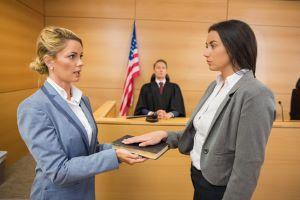Should Alleged Victims Be Allowed to Testify in Sexual Assault Cases?
 Since the beginnings of the “Me Too” movement, a great deal of emphasis has been placed on the issues surrounding sexual violence. Several high-profile cases have taken place in the past couple of years, including the Brock Turner case, in which a college student was convicted of three counts of sexual assault and sentenced to only six months in jail. Another more recent case is that of Harvey Weinstein, the media mogul who was convicted of two counts of sex crimes after years of allegations and trials. Weinstein’s case was of interest to the criminal justice community in particular for the choice of witnesses permitted to testify during the trial.
Since the beginnings of the “Me Too” movement, a great deal of emphasis has been placed on the issues surrounding sexual violence. Several high-profile cases have taken place in the past couple of years, including the Brock Turner case, in which a college student was convicted of three counts of sexual assault and sentenced to only six months in jail. Another more recent case is that of Harvey Weinstein, the media mogul who was convicted of two counts of sex crimes after years of allegations and trials. Weinstein’s case was of interest to the criminal justice community in particular for the choice of witnesses permitted to testify during the trial.
Sexual Assault Cases Often Involve “Prior Bad Acts” Witnesses
It is not uncommon for trials involving allegations of sexual misconduct to allow character witnesses to testify about the defendant’s past behavior. These “prior bad acts” witnesses may allege that the defendant committed previous acts of sexual misconduct, even if there were never any charges or convictions pursued for the supposed acts. In two recent high-profile cases, prior bad acts witnesses were involved. In the Weinstein case, three additional witnesses were permitted to testify against Weinstein, even though charges were never pursued for the misconduct the witnesses alleged. In another case involving actor Bill Cosby, five women testified against him, and none of these witnesses’ allegations resulted in criminal charges. It has been speculated that these witnesses played a significant role in the defendants’ convictions.
Implications of Allowing These Types of Witnesses
The fact that most courts allow prior bad acts witnesses is something of concern in the criminal justice community. This practice allows prosecutors to solicit testimony from alleged victims in cases where a defendant was never charged with a crime or found guilty, including in cases where prosecutors deemed that the defendant’s alleged actions were not substantial enough to warrant criminal prosecution. In some cases, witnesses may even testify about alleged incidents that were never reported to police or doctors. Because of this, many criminal defense attorneys have called the legitimacy of prior bad acts witnesses into question and argued against the use of this type of evidence.
Contact a Hartford, CT Sex Crimes Defense Attorney
In some cases, judges may permit the use of witnesses describing prior bad acts to demonstrate a defendant’s character. However, it can often be difficult to determine whether the witnesses’ claims are legitimate. If you have been accused of a sex crime, you should contact a Connecticut sexual assault defense lawyer as soon as possible. At the Woolf & Ross Law Firm, LLC, we can help you understand the best defense strategy in these cases, and we will help determine how to respond to these types of witnesses. If you have been accused of sexual assault, call our office today at 860-290-8690 to schedule a free consultation.
Sources:
https://www.law.indiana.edu/instruction/tanford/b723/07badacts/T07.pdf
https://abcnews.go.com/US/weinstein-trial-spotlights-prior-bad-acts-witnesses/story?id=68082022
https://casetext.com/rule/connecticut-court-rules/connecticut-code-of-evidence/article-iv-relevancy/section-4-5-evidence-of-other-crimes-wrongs-or-acts-generally-inadmissible






